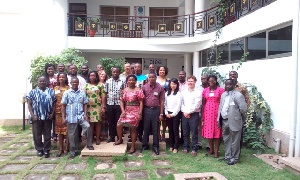 The meeting brought together a diverse group of experts from local and international institutions
The meeting brought together a diverse group of experts from local and international institutions
The Adaptation at Scale in Semi-Arid Regions (ASSAR) Africa-team Project has come out with activities to enhance climate change adaptation in the Upper West region and Koutiala in Mali as its way of giving back to society.
The activities include; schools competition on climate change adaptation, Smart Water Management to strengthen irrigation management practices for dry season farming, Women, Work and Adaptive Capacity building, and Land Adjustment to reduce conflict associated with land access in Mali.
This was announced at the just-ended High level research-practitioner engagement activity in Accra to share the key findings from ASSAR research work in semi-arid regions of Ghana, obtain feedback on key issues emerging from adaptation research relating to agriculture, gender dynamics, water security and natural resource management.
It also discussed the strategic pathways to addressing barriers and supporting enablers towards transformative adaptation for semi-arid livelihoods in Ghana as well as engaging in power analysis to identify key players relevant to influence transformative change for food and water security in the region.
The meeting, which brought together a diverse group of experts from local, national, and international institutions, including governmental and non-governmental bodies also allowed for discussions and feedback as well as engaging in power analysis to identify key players of change for a transformative adaptation.
It was organised by the Institute for Environment and Sanitation Studies (IESS), University of Ghana, global change System for Analysis, Research & Training (START) and OXFAM GB, for Directors of Agriculture, District Directors of Development Planning, to find ways of incorporating ASSAR research findings in the District Assemblies’ medium term planning to ensure food security in the research areas.
Professor Christopher Gordon, Director of IESS, University of Ghana, said the activities were in support of the Research into use (RiU) aspects of the ASSAR project where results and key findings from research activities are shared with relevant stakeholders who have interest in promoting effective and transformative adaptation for food and water security in semi-arid regions of Ghana.
He said the activity was a component of a collaborative research project between the three institutions on the Adaptation at Scale in Semi-Arid Regions (ASSAR) project, under the Collaborative Adaptation Research Initiative in Africa and Asia (CARIAA) programme, funded by the International Development Research Centre (IDRC).
He said since 2014, researchers and partners from the ASSAR project had been working to gain a better understanding of the challenges and opportunities of climate change and variability for communities in the Upper West Region of Ghana.
These challenges, he said, include; impacts of biophysical changes such as delays in the onset of rainfall, increased dry spells, and changes in soil moisture and fertility; as well as socio-economic concerns related to the management of natural resources, changes in access to and control over lands, seed and water sources, and changes in markets and access to loans.
Prof Gordon said empirical information on these issues obtained through research is critical for effective planning towards maintaining livelihoods and food security of the growing population of the Upper West Region, whilst also addressing the potential risks of climate change.
Through surveys, interviews and group discussions with those living in Lawra and Nandom Districts, student researchers working with the ASSAR project have obtained evidence on how these changes are affecting different people in different ways, he said.
The Director said the student researchers have interacted with crop and livestock farmers from different social groups including men, women, and youth as well as the disabled, to learn how people were dealing with challenges in particular ways.
“The team has also studied the role of Traditional Authorities, NGOs and government agencies in protecting natural resources and supporting farmers. Stakeholder engagements have been conducted with district and national level policy makers to gain a better sense of their perspectives on these changes and how to address them, he added.
Prof Gordon said ASSAR project bought into government policy of One District, One Factory to enable farmers add value to their products to increase income and urged District Assemblies to consider implementing some of the research findings in their medium term planning to enhance the livelihood of the people as well as ensure food security in the country at large.
The IESS is collaborating with partners, expert institutions (START, Oxfam, and ICRISAT), including ministries, local government and non-governmental authorities, community leaders, humanitarian organisations, as well as the private sector.
The IESS, University of Ghana is the host institution for the Adaptation at Scale in Semi-Arid Regions (ASSAR) project in Ghana.